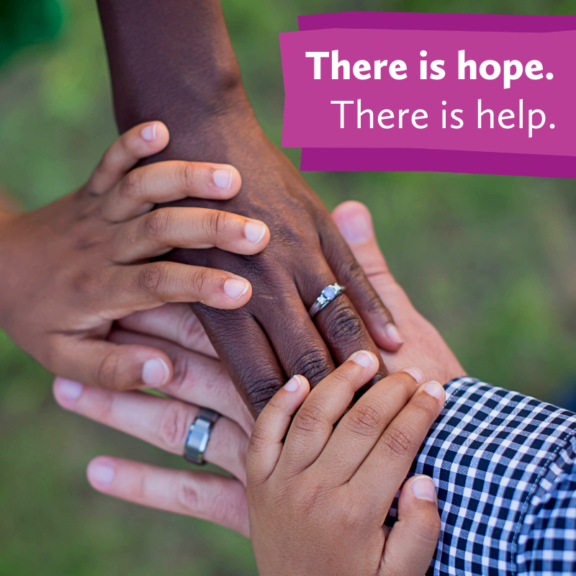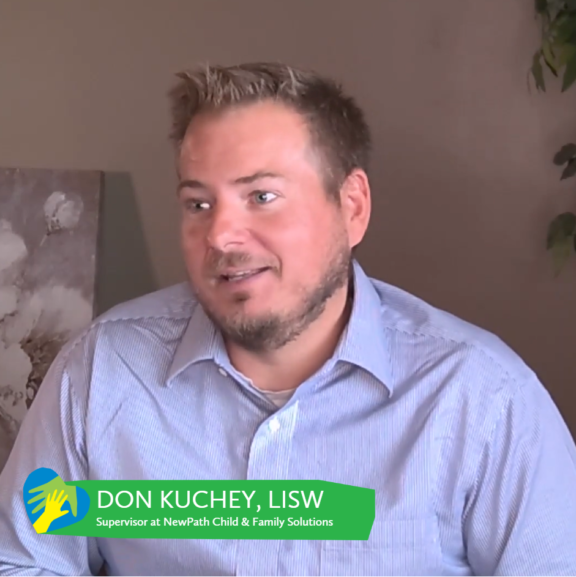
Get Hope & Help
For You or a Loved One
NewPath collaborates with professionals in your area who are ready to provide substance use support and the help you need to ignite hope and change futures. NewPath Child & Family Solutions provides behavioral health services to youth and can collaborate with other providers for addiction services. NewPath does not provide addiction services.
Disclaimer: NewPath provides behavioral health support. We do not offer drug or alcohol addiction treatment services.
Substance Use Among Children, Teens, and Adults
Teen Substance Use & Risk
Parents play a critical role in their children’s lives. As their children grow into pre-teens and teens, parents worry about new risks they may experience. One risk is using substances such as alcohol, marijuana, tobacco, and other drugs. Parents can help by talking to their teen’s pediatrician about screening for substance use. The American Academy of Pediatrics recommends screening for substance use in children, starting at nine years of age (CDC).
Know the signs & Symptoms FOR SUBSTANCE US & MENTAL ILLNESS
Because many combinations of dual diagnoses can occur, symptoms vary widely. Mental health clinics use alcohol and drug screening tools to identify at-risk people. Symptoms of substance use disorder may include:
- Withdrawal from friends and family
- Sudden changes in behavior
- Engaging in risky behaviors
- Developing a high tolerance and withdrawal symptoms
- Feeling like you need a drug to be able to function
Symptoms of a mental health condition can also vary greatly. Warning signs, such as extreme mood changes, confused thinking or problems concentrating, avoiding friends and social activities, and thoughts of suicide, may be reasons to seek help.
Mental Health & Substance Use
There is a clear link between depression and other mental health symptoms and substance abuse. Substance use disorders are defined as the repeated misuse of alcohol and drugs. These often coincide with individuals with mental illness, usually to cope with overwhelming symptoms they may be experiencing. The term dual diagnosis or co-occurring disorders describes the combination of these two illnesses. Either disorder (substance use or mental illness) can develop first (NAMI).
Mental health and substance use disorders affect people from all walks of life and all age groups. These illnesses are common, recurrent, and often severe but treatable, and many people recover. Mental disorders involve changes in thinking, mood, and behavior. These disorders can affect how we relate to others and make choices. Reaching a level that can be formally diagnosed often depends on a reduction in a person’s ability to function due to the disorder. For example:
- Serious mental illness is defined by someone over 18 having (within the past year) a diagnosable mental, behavior, or emotional disorder that causes severe functional impairment that substantially interferes with or limits one or more major life activities.
- For children and teens, the term “Serious Emotional Disturbance” refers to a diagnosable mental, behavioral, or emotional disorder resulting in functional impairment that substantially interferes with or limits the child’s role or functioning in their family, school, or community activities.
- Substance use disorders occur when the recurrent use of alcohol and drugs causes clinically significant impairment, including health problems, disability, and failure to meet major responsibilities at work, school, or home (SAMHSA)
Did You Know?
The use of nicotine products (Smoking, vaping, chewing, etc.) dramatically impacts the absorption rate of psychotropic and other medications requiring the individual to need higher medication doses to get effective treatment (Don Kuchey, NewPath Child & Family Solutions).
Free Mental Health Screening Tool
Take the first steps for your child or your mental health. Mental Health America provides free information, resources, and free & confidential mental health screenings: MHA Screening Tool.
Finding Treatment for Substance Use & Mental Health
Although NewPath Child & Family Solutions is not a subtance use nor addiction recovery provider, we collaborate with other providers and understand the benefit of providing youth services before they self-diagnose. The best treatment for dual diagnosis is integrated intervention when a person receives care for their diagnosed mental illness and substance use disorder. The idea that “I cannot treat your depression because you are also drinking” is outdated — current thinking requires both issues be addressed.
You and your treatment provider should understand how each condition affects the other and how your treatment can be most effective. Treatment planning will not be the same for everyone, but here are a few common elements:
Detoxification
The first significant hurdle people with a substance use disorder will have is to pass detoxification. Inpatient detoxification is generally more effective than outpatient for initial sobriety and safety. During inpatient detoxification, trained medical staff monitors a person 24/7 for up to seven days. The staff may administer tapering amounts of the substance or its medical alternative to wean a person off and lessen withdrawal effects.
Inpatient Rehabilitation
A person experiencing a mental illness and dependent patterns of substance use may benefit from an inpatient rehabilitation center where they can receive medical and mental health care 24/7. These treatment centers provide therapy, support, medication, and health services to treat substance use disorder and its underlying causes.
Psychotherapy
Psychotherapy is usually a large part of an effective treatment plan. In particular, cognitive behavioral therapy (CBT) helps people with dual diagnoses learn how to cope and change ineffective patterns of thinking, which may increase the risk of substance use.
Medications
Medication helps treat mental illness. Certain medications can also help people experiencing substance use disorders ease withdrawal symptoms during detoxification.
Supportive Housing
Group homes or sober houses are residential treatment centers that may help newly sober people or those trying to avoid relapse. Sober homes have been criticized for offering varying levels of quality care because licensed professionals do not typically run them. Please do some research before making a selection.
Self-Help and Support Groups
Dealing with a dual diagnosis can feel challenging and isolating. Support groups allow members to share frustrations, celebrate successes, find referrals for specialists, find the best community resources, and swap recovery tips. They also provide a space for forming healthy friendships filled with encouragement to stay clean. Here are a few groups to check out:
- Double Trouble in Recovery is a 12-step fellowship for people managing mental illness and substance use disorders.
- Alcoholics Anonymous and Narcotics Anonymous are 12-step groups for people recovering from alcohol or drug addiction. Be sure to find a group that understands the role of mental health treatment in recovery.
- Smart Recovery is a sobriety support group for people with various addictions that are not based on faith.
Finding Treatment for Youth: Substance Use & Mental health
Many providers in Southwest Ohio provide services for adults struggling with substance use. Providers like Abraxas Youth & Family Services and Talbert House work with youth.
Community Resources
- NAMI Resource Guide: https://namiswoh.org/resources/local-resources/search-local-resources/
- Ohio CareLine: 1-800-720-9616 | Provides emotional support for callers 24 hours a day, seven days a week
- OhioMHAS Toll-Free Bridgeline: 1-877-275-6364 | Refers callers to treatment, answers questions, and responds to concerns about treatment; available from 8 a.m.-8 p.m. Monday through Friday except state holidays
- Crisis Text Line: Text 4HOPE to 741 741 | Connects those in crisis with a crisis counselor who can provide emotional support 24/7 https://www.crisistextline.org/
- SAMHSA Mental Health Treatment Locator: 1-800-662-HELP (4357) | An online tool for persons seeking mental health treatment https://findtreatment.samhsa.gov/
- SAMHSA Addiction Treatment Locator: 1-800-662-HELP (4357) | An online tool for persons seeking addiction treatment https://findtreatment.gov/
- Suicide & Crisis Lifeline: Dial 988 | A national network of local crisis centers that provides free and confidential emotional support 24/7 https://988lifeline.org/
- NAMI Ohio Helpline: 1-800-686-2646 or text NAMI to 741 741 | Advocacy, education, and support services for those affected by mental illness and their families
- OACBHA Board Map: Interactive map that connects users directly to their local Mental Health and Recovery Services Boards https://www.oacbha.org/mappage.php
- Ohio Department of Aging Staying Connected Program: 833-ODA-CHAT (1-833-632-2428) | Provides check-in services and connection to aging programs for those 60 and older https://aging.ohio.gov/wps/portal/gov/aging/care-and-living/get-help/staying-connected
- Ohio Housing Finance Agency Ohio Housing Locator: Helps find all types of housing throughout Ohio https://www.ohiohousinglocator.org/
- Adult Care Facility Locator: Helps find group homes that serve individuals with mental illness throughout Ohio http://oacfalocator.org/
- Assistance for First Responders: Resource for first responders in need of mental health support and treatment https://mha.ohio.gov/Schools-and-Communities/First-Responders
- National Domestic Violence Hotline: 1-800-799-7233 (SAFE) | Provides 24/7 confidential support and access to resources for those affected by domestic violence (live chat) https://www.thehotline.org/
Additional Tips for Your Mental Health
There are a few tools you can practice daily to take a mental health break which can help with your mood and keep you grounded. It is recommended to seek professional treatment with trained providers for your mental health. A few tools you can use in your own time that you may enjoy are below:
- NewPath Mindfulness Minute: https://newpath.org/mindfulness/
- Mental Health Break: https://newpath.org/take-a-mental-health-break/
Take The Pledge
Take the pledge and answer a few questions below for a chance to win a $50 Amazon Gift Card. The brief survey should only take approximately 5 minutes.
NewPath provides mental and behavioral health services. We do not provide drug or alcohol addiction treatment. Any substance‑use content on this site is informational only.

